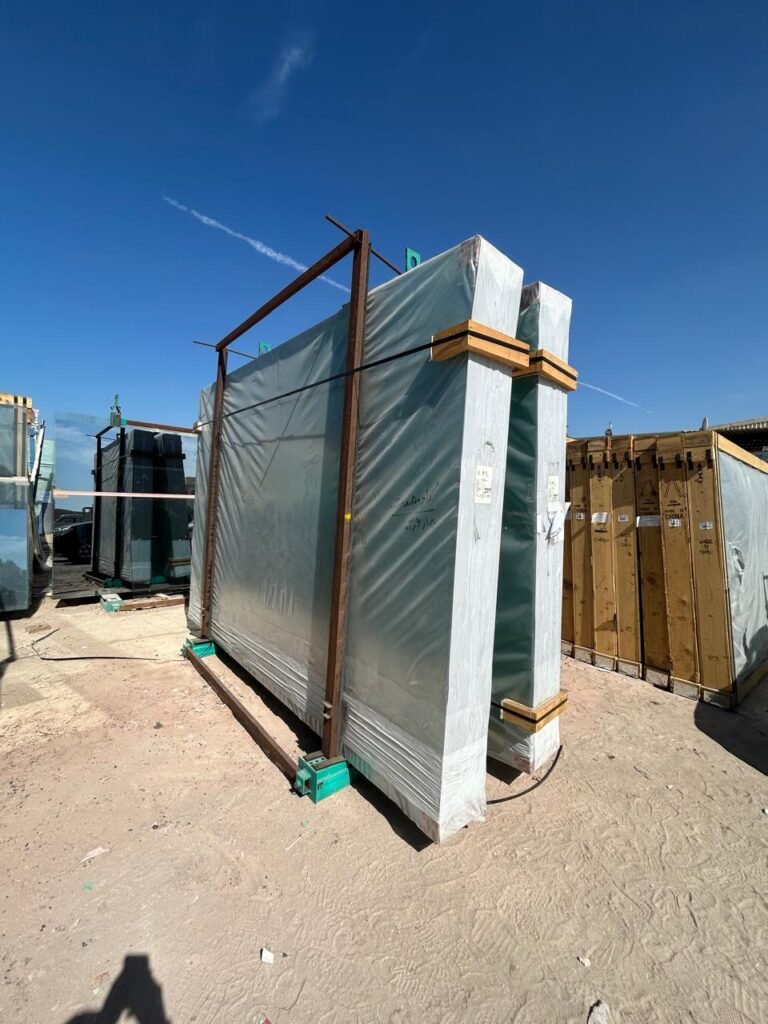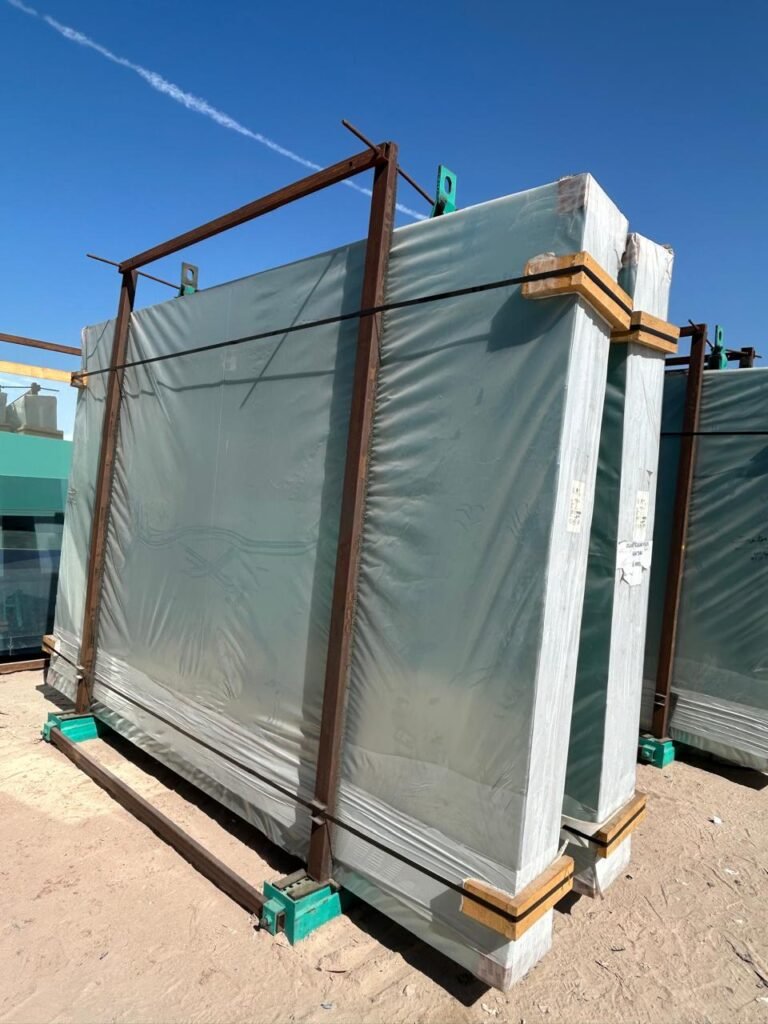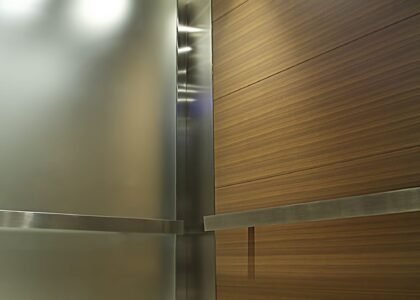
The Glass Manufacturing Process
Glass Factory UAE : The glass manufacturing process in the UAE is a complex and intricate system that involves multiple stages and various raw materials. Fundamental to glass production are silica sand, soda ash, and limestone, which are blended to form a homogenous batch. Silica sand serves as the primary component, providing the essential silicon dioxide required for glass formation. Soda ash is added to lower the melting point of silica, making the process more energy-efficient. Limestone contributes to the stability and durability of the glass, preventing it from dissolving in water.
Once the raw materials are properly mixed, the first significant stage in the manufacturing process is melting. This occurs in high-temperature furnaces, where the mixture is heated to approximately 1,700°C. The extreme heat transforms the raw materials into a molten glass state. Following this, the molten glass is shaped into various forms through a process known as molding. This can involve blow molding, press molding, or casting, depending on the type of glassware being produced. Each method utilizes specialized machinery designed to create specific shapes and designs, highlighting the importance of technology in modern glass production.
The next step in the process is annealing, which involves slowly cooling the molded glass in a controlled environment. This stage is crucial as it relieves internal stresses, ensuring greater durability and minimizing the risk of breakage. Finally, the finishing stage involves adding aesthetic touches, such as polishing, coating, or printing, thereby enhancing the overall quality and appeal of the glass products. Throughout these phases, skilled labor plays a vital role, as experienced technicians oversee the operations, perform quality checks, and maintain machinery to uphold product standards. The combination of advanced technology and skilled craftsmanship is essential to ensure the high quality of glass produced in the UAE factories.
Sustainability Practices in Glass Factory UAE
The glass industry in the UAE has increasingly focused on sustainability practices to minimize environmental impact and promote efficient resource use. One of the key initiatives adopted by many glass factories is the recycling of glass materials. Circular economy principles encourage the reuse of glass, significantly reducing the amount of waste sent to landfills. Many factories have established partnerships with local municipalities and waste management companies to source post-consumer glass for recycling. This practice not only conserves raw materials but also decreases energy consumption, as using recycled glass to produce new items requires less energy than manufacturing glass from virgin materials.
In addition to recycling efforts, many Glass Factory UAE have begun integrating renewable energy sources into their production processes. Solar panels and wind energy systems are increasingly becoming integral to operations, aiming to offset fossil fuel usage. Facilities such as Emirates Glass have implemented solar energy solutions, which significantly contribute to their overall energy needs. By harnessing renewable energy, these factories are reducing their carbon footprint and demonstrating commitment to environmental stewardship.
Moreover, advancements in eco-efficient technology have played a crucial role in enhancing sustainability in glass manufacturing. Factories are adopting state-of-the-art equipment designed to minimize energy consumption and optimize production processes. Innovations such as high-efficiency furnaces and waste heat recovery systems lead to a noticeable reduction in greenhouse gas emissions. For instance, the National Glass Industries has invested in advanced technologies resulting in lower energy usage and improved productivity. This focus on sustainability not only benefits the environment but also resonates with consumers seeking eco-friendly products.
In conclusion, the UAE glass factories are actively embracing sustainability practices, including glass recycling, renewable energy adoption, and state-of-the-art production technology, positioning themselves as environmentally responsible leaders in the industry.
The Economic Impact of the Glass Factory UAE
The glass industry plays a significant role in the economic landscape of the United Arab Emirates (UAE), contributing not only to employment but also to the nation’s export trade and overall industrial diversification. As a rapidly growing sector, it has witnessed impressive developments driven by both domestic demand and international markets. The UAE’s strategic location allows it to serve as a gateway for glass products, exporting them to various regions, thus enhancing its trade balance and positioning the country as a key international player in this industry.

Employment opportunities associated with the glass manufacturing sector are significant, with thousands of jobs created in various capacities, ranging from production and processing to research and development. This aspect aids not only in reducing unemployment rates but also in developing a skilled workforce, which is essential for sustaining growth and improving productivity. Furthermore, the involvement of numerous small and medium-sized enterprises (SMEs) in the glass industry contributes to the diversification of the economy, aligning with the UAE’s broader vision of reducing reliance on oil revenues.
Market trends indicate continued growth in the glass sector, driven by increasing demand for innovative and sustainable building materials. The rise in construction activities in the UAE—bolstered by significant investments in infrastructure—has created ample opportunities for the glass industry. However, challenges exist, including fluctuating raw material costs and competitive pressures from international manufacturers. The government has undertaken strategic initiatives to address these challenges, providing incentives for innovation and sustainability within the sector. These measures include funding for research and development, establishing industry standards, and promoting the use of eco-friendly materials.
Through these initiatives, there is a concerted effort to position the glass industry as not only a vital part of the UAE’s economy but also as a key player in the global market, ensuring resilience and adaptability in an ever-evolving landscape.
Innovations and Trends Shaping the Glass Factory UAE
The Glass Factory UAE is undergoing significant transformations, driven by a range of innovations and trends that are reshaping its landscape. One notable advancement is the emergence of smart glass technology, which offers a variety of functionalities including energy efficiency, privacy control, and light modulation. This type of glass integrates advanced materials that react to environmental stimuli, including heat and light, making it an attractive option for modern architectural designs. This innovation is particularly appealing for high-rise buildings and commercial spaces where energy consumption is a critical factor.

In addition to smart glass, the application of nanotechnology in glass production is gaining traction. By incorporating nanoparticles, manufacturers can enhance the durability, thermal insulation, and reflective properties of glass products. This technology not only leads to superior performance but also facilitates the development of specialized glass types, such as self-cleaning glass and antimicrobial coatings, which are increasingly sought after in both residential and commercial sectors. As architects and designers embrace these innovations, the possibilities for creative applications in buildings and interiors expand significantly.

Moreover, there is a growing demand for customized and decorative glass products among consumers. This trend has prompted manufacturers to adopt more flexible and agile production methodologies, allowing for greater customization in design and materials. From intricately designed glass panels to bespoke glass fixtures, this demand is influencing production techniques and marketing strategies. As a result, manufacturers are investing in advanced technologies like digital printing, which enable the creation of unique and intricate designs that cater to individual customer preferences.
The convergence of these trends and innovations is leading to a more dynamic and competitive market for glass products in the UAE, enhancing the industry’s ability to meet the evolving needs of consumers and businesses alike.






